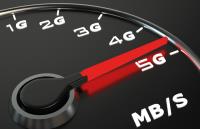 Add My Company
Add My Company
Sign In
Is 5G coming to Sheffield?
04-06-2019

What began with smartphones has quickly transformed into a marketplace full of ‘smart’ technologies. Anything and everything from our phones and televisions to our fridges and pet cameras has wireless integration for the tech-savvy consumer. As we continue to purchase more ‘smart’ technology and use streaming services over cable, our current 4G network will increasingly struggle to deal with the high demands placed on it. By 2020 there will be over 20 billion connected devices vying for limited bandwidth and that doesn’t even take into account the demands of live streaming and VR content. With this demand in mind, telecommunication companies have been investing heavily in developing the technology and infrastructure for 5G networks.
So, what exactly does 5G mean? Put simply, 5G means the fifth generation of mobile wireless systems. To put that into context, 1G was the beginning of mobile technology in the 90s, 2G involved the first text messaging capabilities between wireless devices, 3G involved the first mobile browsing capabilities, and 4G aimed to improve the performance and speed of all of the above. Recently, we’ve also seen 4G LTE, which is laying the groundwork that 5G will be built upon. The fifth generation or 5G will provide the extra bandwidth needed to keep billions of devices connected to the internet, improve HD download speeds, reduce load times, and provide more reliable streaming of 4K video and IoT connectivity. Some experts have even suggested that 5G will be fast and reliable enough to eliminate the need for a home broadband connection.
When is it Coming to the UK?
By 2020, the first 5G smartphones are set to hit the market with Samsung and Apple leading the way. In the UK, EE has been one of the telecommunication providers at the forefront of 5G integration. They are set to turn on 5G in London, Cardiff, Edinburgh, Belfast, Birmingham, and Manchester by the middle of this year. Then, depending upon how it rolls out in those cities, the next 10 UK cities to receive 5G connection will include Sheffield, Nottingham, Glasgow, Newcastle, Liverpool, Leeds, Hull, Leicester, Coventry, and Bristol.
The Downside of 5G
While faster download speeds and increased bandwidth may seem like a win-win situation, there are some concerning downsides surrounding 5G implementation. The faster processing speeds needed for 5G connection require the use of extremely high-frequency millimetre waves (MMW). These MMVs travel a shorter distance than those used for 4G connections, are easily absorbed by rain/plants and can experience interference caused by buildings. Although the radio frequency radiation (RF) emitted by 5G is lower than existing 4G cell phone towers, the number of antennas placed around our cities and near our homes would noticeably increase to accommodate the shorter travelling MMVs. The cause for concern here lies in the fact that higher frequency MMWs give off the same level of radiation as an airport body scanner and the long-term health effects of constant exposure to such radiation have yet to be studied. The 5G infrastructure may also negatively affect the environment as low-level radiation has been shown to drive birds from their nests and cause locomotion problems that ultimately reduce their lifespan. Bee populations will also be affected by the radiation as it causes reduced egg-laying capabilities and subsequently smaller colony sizes.
There’s no denying the fact that 5G could make how we work, play, and live easier (and faster). However, the long-term effects of 5G on the human (and animal) population and the environment are still largely unknown. So, while we may be excited for faster download speeds and seamless IoT connectivity, the jury is still out on whether the pros outweigh the cons.
For more information on Is 5G coming to Sheffield? talk to KTR U.K. Ltd
Enquire Now
List your company on FindTheNeedle.

